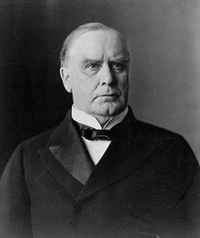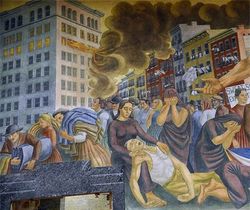Think of this as Volume 15, Number 44 of A-Clue.com, the online newsletter I've written since 1997. Enjoy.

Elites hate ideology but don't mind partisanship. Popular movements are inherently ideological, but that ideology may or may not be partisan.
At issue here are Occupy Wall Street and the Tea Party. The former is a cry from the powerless. They have no advocate in government save (maybe) Bernie Sanders. (Elizabeth Warren remains outside it.) The latter was created by, funded by, and of benefit to a specific wing of a specific party. It had advocates in government. It has run government for a decade.
The “third wave” of American crises, which I've been thinking about a lot lately, is this. The politic model is of the last crisis. The economic model is that of two crises ago. But the essence of the crisis goes back three generations, a full century.
What's happening today has a lot more in common with the 1890s and 1900s, in other words, than it does with the 1930s, even though the economic model we all use today comes from there. And it has more in common politically with the crisis of the last generation, the Vietnam era, in which the rising tide had to create its own institutional supports, and actually fought the Crisis President (Nixon) as hard as it did the hippies and their enablers.
Or, to go back briefly, the 1960s were an echo of the Civil War, and the 1930s an echo of the Jacksonian era. You might say we're now playing The 1899 Game.

These demands rose on the back of a new medium, newspapers, just as the demands of our time ride on a new medium, the Internet. The difference is that while newspapers delivered the message, in this case the medium IS the message. The medium, in other words, encompasses the message, the messenger, the means, and the end. It can be used to create the message, to advocate it, to organize around it, and to effect political change.
The genius of the American system, as it has evolved, is that it consists of four parties. Each party has a business wing (partisan, non-ideological) and an ideological wing. The problem, from the point of view of the protesters, is that they can't see an ideological wing to attach themselves to.
This is why blogs like DailyKos, Firedoglake, and Hullaballoo have been churning like mad these last weeks. They're the brains of the new movement, but they have lacked the heart and body to do much but babble. They were buried by Kerry and co-opted by Obama. Their candidates' victories were tainted (to protesting eyes) by the campaign contributions, and compromises necessary, to win in those political environments. The Netroots attached themselves to candidates whom they knew were flawed, ideologically, in order to win partisan battles.
So the blogs are doing penance. As in all cases like this, the people are way ahead of their leaders. This was also true during the Progressive Era. Things like the 1906 Food and Drug Act, and Teddy Roosevelt's trust-busting rhetoric, were weak tea compared with what the protesters of that time wanted. And the aims of that era's movements would take another generation (or two) to achieve.

This incoherence is at the heart of every political crisis. In times of crisis what people want is always disconnected from what seems to be happening, from what leaders seem willing to offer. The essence of a crisis leader is that he rides these demands like a wave, in the face of a continuing wind from the other side. What looks in retrospect like genius is, at the time, a daily slog.
Abraham Lincoln didn't see himself as a Great Man. No great leader does. (Only dictators do – inflated self-regard is the first sign of totalitarianism.) It's a daily slog, holding tight to what appear to ideologues like small ideas, half-a-loaf goals, against enormous odds. Knowing you cannot possibly finish the job, you can only begin anew.
What President Obama faces, as I say, has a lot more in common with what William McKinley faced than what any other crisis leader has faced. Accelerating change threatens to leave the mass of our people behind. Reform is necessary. But the plutocrats will do everything in their power to prevent reform, to maintain their power. And in this case, those plutocrats have global reach.
Thus the leader must have global reach. As Occupy Wall Street has global reach. Transforming those basic demands into global reform is the political objective of our time. Nationalism, corporatism, sectarianism, they all militate against it.

What's happening is the creation of a global political center, and that center will lack coherence for many years yet, hopefully, be visible before my own life ends.








